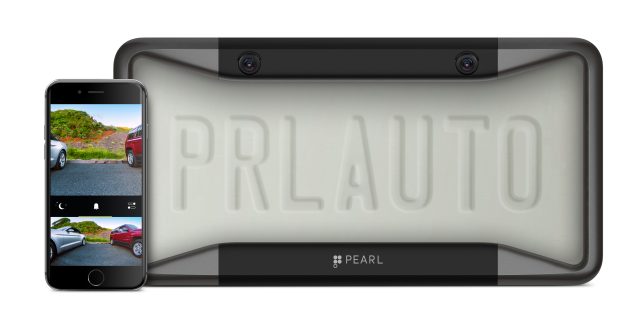
There have been a lot of rumors over the past year or so about Apple secretly working on a car. While we don't have anything concrete to report on that front, we do know that some former Apple employees have left the mothership to work on car-related tech. Their company is called Pearl, and it just emerged from stealth mode with a rather cool wireless backup camera system, called RearVision.
As you might know, Congress has mandated that all cars from 2019 have a backup camera installed. And indeed, many new cars come with backup cameras already, with varying quality (some of them are truly horrible). But with about 260 million cars already on the road, the vast majority have to rely on old-fashioned mirrors to see behind them. Enter RearVision. We spoke with company cofounder and CEO Bryson Gardner ahead of the launch to find out a bit more.
"At Apple we loved taking the very latest technology and getting it into the hands of the consumer as quickly as possible," Gardner told Ars. "We wanted to find something that was infused with technology but ripe for change—we started looking at how technology gets into cars, and it's quite an extended timeline. There's a long design cycle, and it only appears in some makes and models; it can take 10 to 20 years to appear across the production line. The other challenge is the technology in new cars is designed to be stagnant, so it stays the same throughout the lifetime of the car, which is over 17 years now."
After talking to lots of drivers, Gardner and his colleagues saw their opportunity. "We didn't want to generate demand but fulfill it," he told us.
The product consists of a license plate frame, an OBDII adapter, a phone mount, and a mobile app (for iOS and Android). Within the license plate frame, there are not one but two 180-degree fisheye cameras (one for daylight and an IR camera for night vision), plus a battery and solar panel to power them. The cameras send a compressed stream wirelessly to the OBDII dongle, which performs object detection on the video feed and sends it to your phone.
The display can be in landscape, showing a wide-angle view behind you, or in portrait with two displays, one close-in and another wide-angle. You can also pan the camera in the close-in view, and that object detection software will alert you if the camera senses you're in danger of hitting something or if a pedestrian or another car is about to cross your path. The image quality—admittedly from a product demo—was extremely good, putting to shame even the best backup cameras we've experienced. RearVision cameras are also far better than the norm, which as we've already mentioned can be diabolical (we're looking at you, McLaren 650S).
There's no Android Auto or CarPlay support yet, although that may come in time—Gardner told us he and his colleagues continue to have a good relationship with their former coworkers at Apple. Typically those casted infotainment OSes are found on the very newest cars, most of which already have backup cameras. Rather, the target market is the two-car household where a newer vehicle has a rearview camera and an older vehicle lacks one.
Installation is as simple as screwing the license plate holder onto your car, plugging in the adapter, and installing the app. Yes, we know that you can find other wireless backup cameras on the market, but as far as we know none of those will power themselves from the sun or be as simple to fit. However, that convenience and ease of use comes with a price—$500 in this case.
Gardner recognizes that Pearl is at the premium end of the market but told us that RearVision's core functionality will be improved over time with better algorithms and new features. "Rather than wait for the promise of the autonomous car, we want to use some of the technology that's ready now to inform the human driver and increase human driver awareness," he said.
RearVision is available to order today, and products should start shipping in September.
reader comments
107